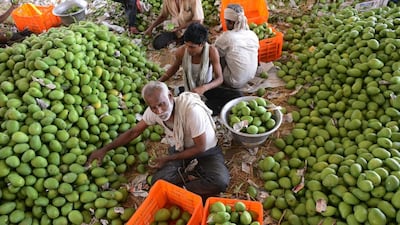Mumbai // A European Union ban on Alphonso mangoes from India, which came into effect yesterday, is set to hit profits of exporters and farmers.
“It’s a very bad scenario,” said Arvind Morde, who is a partner in Venubai Vithal Morde, a Mumbai-based seller and exporter of Alphonso mangoes. “Substantial business will be lost.”
He said that the EU was the firm’s largest export market, where it ships as many as 20 tonnes of Alphonso mangoes each year.
The same ban put on the pricey mango variety, frequently called the “king of fruits”, has also been placed on four vegetables from India. This came after fruit flies were found in consignments. The ban is scheduled to run until December, although the Indian government is trying to get the EU to lift the ban.
The season for Alphonso mangoes in India typically lasts between mid-March and the end of May.
In the financial year ended March 2013, 3,304 tonnes of mangoes were shipped to the United Kingdom, generating revenue of 325 million rupees (Dh19.7m) for India, according to figures from the Indian Agricultural and Processed Food Products Export Development Authority. But the vast majority of India’s mango exports are shipped to the Arabian Gulf, with the UAE being the biggest market. Last year, 37,598 tonnes of the fruit were shipped to the Emirates, generating revenue of more than 1.6 billion rupees.
Domestic prices are expected to decline this year as the supply increases in the local market.
Raju Mane, who owns Venkatesh Enterprises, a fruit retail and export company in Mumbai, which exports to countries in the Gulf including the UAE, said the ban could lead to a fall in Alphonso mango prices of about 20 to 30 per cent this month. His retail price for yesterday was 600 rupees to 800 rupees for 12 mangoes.
India is the world’s biggest grower of mangoes, with a 40 per cent share of total world production data from the UN Food and Agriculture Organization.
Industry bodies have also expressed concerns over the ban.
“The way it has happened leaves open the question if this is the only measure or some more could be expected,” said Sidharth Birla, the president of the Federation of Indian Chambers of Commerce and Industry.
“We understand that this matter was under discussion for some time and it is therefore surprising that the EU side has taken such a decision unilaterally. This defies the spirit of cooperation that one would expect. This move would have a bearing on the farmers and exporters from India as well as impact trade and consumers in UK and other countries in the EU.”
business@thenational.ae
Follow us on Twitter @Ind_Insights

